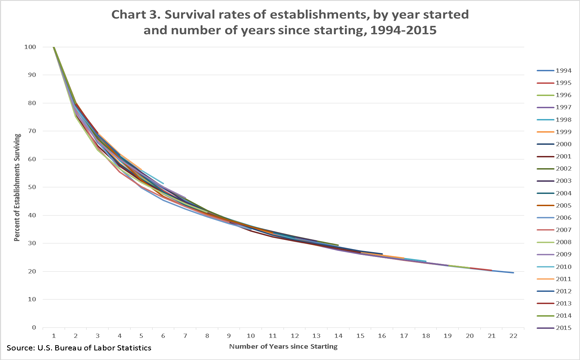4.2 The Risks and Rewards of Entrepreneurship
Entrepreneurs take on risk and manages it for success. Many times we hear of the successful entrepreneur, especially within mainstream media, however we rarely hear of the entrepreneur who crashes and burns[2]. This fosters a cloudy view on what entrepreneurship really is and what is needed to be successful.
To give some context, business expert Patrick Henry states, “75% of entrepreneurship venture-backed startups fail… the failure rate of all U.S. companies after five years is over 50%, and over 70% after ten years”[2] (see Figure 2). This demonstrates how challenging it is to start a business, especially for entrepreneurs who place everything they have in their their ventures. So, why do upstarts take on such a challenge in the first place, aside from drive, motivation, and creativity? It is because these people are interesting and have a deep story behind why they got started. These are the same things that get investors excited on the basis of innovation, creativity, and a new way to help people within society. The old adage of ‘high-risk, high-reward’ perfectly encompasses the life of an entrepreneur, because financially there is a risk, but does the financial risk outweigh the emotional and innovative rewards the venture can produce?

There is much talk on how risk and reward are exemplified within start-up organizations. As an entrepreneur, it is important to be reflective when looking at the company, and the people who work with you. Certainly, drive could be forceful because of the massive success that is desired, but the humble actor may be a more useful tool. This relates to the concept of entrepreneurial culture, which is a mixture of personality and management identified by those who create not only the business, but the culture that surrounds it[2]. Even if the company becomes successful, it is important for the organization to grow, change its structure, but keep the same moral and ethical framework it started with. This can help with retention of key employees.
Within modern learning organizations, there is an entrepreneurship culture of creativity and innovation that helps people within society in the form of information and communication technology. Information and communication technology (ICT) is a new tool being used in many educational circles through the use of technology (i.e. computers and Internet) to develop a sense of deep learning for students. Educators who embrace the ICT model want to enhance learning ability, creativity, and innovation of their students by supporting different sensory goals through multi-media visualizations and technological representations[3].
Embracing the culture of entrepreneurship within the learning organization is beneficial not only for the success of the leader or manager, but also for the success of students and other members.. Moving forward, the prediction that the entrepreneurial culture being used in more and more modern learning organizations seems like a clear trend.
Entrepreneurial culture within a learning organization allows an individual to be holistically connected to the venture they decide to undertake. Using the aspects of experience to guide an individuals culture, along with socio-economic and attitudinal factors [4] have an adverse impact on starting an entrepreneurial adventure. Reflecting on the experience and the sociological impact one has to start a venture are paramount to the culture that an organization adopts.
Review Questions:
- According to Patrick Henry, what is the rate of failure for venture-backed startups after 5 years, 10 years?
- What is entrepreneurial culture?
- how would embracing a entrepreneurial culture be beneficial for leaders in a learning organization?

